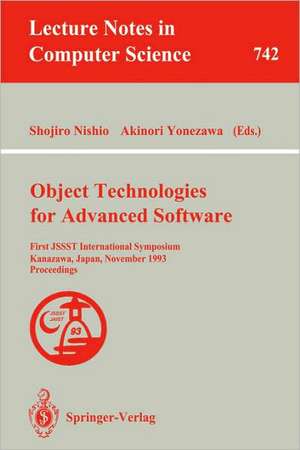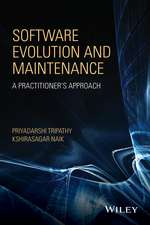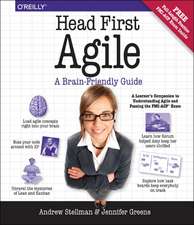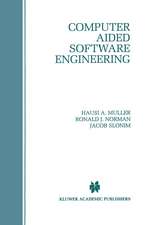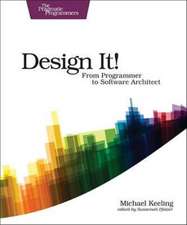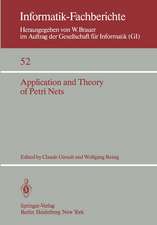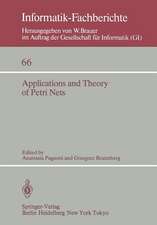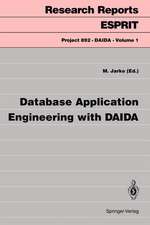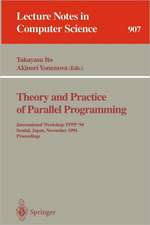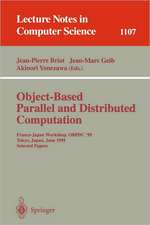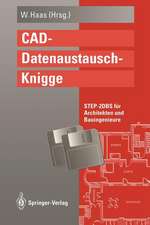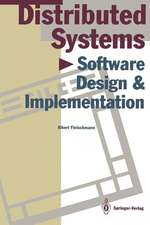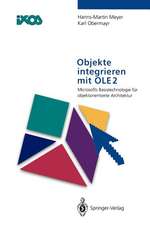Object Technologies for Advanced Software: First JSSST International Symposium, Kanazawa, Japan, November 4-6, 1993. Proceedings: Lecture Notes in Computer Science, cartea 742
Editat de Shojiro Nishio, Akinori Yonezawaen Limba Engleză Paperback – 7 oct 1993
Din seria Lecture Notes in Computer Science
- 20%
 Preț: 1061.55 lei
Preț: 1061.55 lei - 20%
 Preț: 307.71 lei
Preț: 307.71 lei - 20%
 Preț: 438.69 lei
Preț: 438.69 lei - 20%
 Preț: 579.30 lei
Preț: 579.30 lei -
 Preț: 410.88 lei
Preț: 410.88 lei - 17%
 Preț: 427.22 lei
Preț: 427.22 lei - 20%
 Preț: 596.46 lei
Preț: 596.46 lei - 15%
 Preț: 448.04 lei
Preț: 448.04 lei - 20%
 Preț: 353.50 lei
Preț: 353.50 lei -
 Preț: 389.49 lei
Preț: 389.49 lei - 20%
 Preț: 309.90 lei
Preț: 309.90 lei - 20%
 Preț: 645.28 lei
Preț: 645.28 lei - 20%
 Preț: 763.23 lei
Preț: 763.23 lei - 15%
 Preț: 580.46 lei
Preț: 580.46 lei - 20%
 Preț: 310.28 lei
Preț: 310.28 lei - 20%
 Preț: 655.02 lei
Preț: 655.02 lei - 20%
 Preț: 1183.14 lei
Preț: 1183.14 lei - 20%
 Preț: 340.32 lei
Preț: 340.32 lei -
 Preț: 449.57 lei
Preț: 449.57 lei - 20%
 Preț: 591.51 lei
Preț: 591.51 lei - 18%
 Preț: 938.83 lei
Preț: 938.83 lei - 20%
 Preț: 337.00 lei
Preț: 337.00 lei - 20%
 Preț: 649.50 lei
Preț: 649.50 lei - 20%
 Preț: 607.40 lei
Preț: 607.40 lei - 20%
 Preț: 1414.79 lei
Preț: 1414.79 lei - 20%
 Preț: 1024.44 lei
Preț: 1024.44 lei - 20%
 Preț: 583.40 lei
Preț: 583.40 lei - 20%
 Preț: 453.32 lei
Preț: 453.32 lei - 20%
 Preț: 575.49 lei
Preț: 575.49 lei - 20%
 Preț: 1075.26 lei
Preț: 1075.26 lei - 20%
 Preț: 585.88 lei
Preț: 585.88 lei - 20%
 Preț: 825.93 lei
Preț: 825.93 lei - 17%
 Preț: 360.20 lei
Preț: 360.20 lei - 20%
 Preț: 763.23 lei
Preț: 763.23 lei - 20%
 Preț: 340.32 lei
Preț: 340.32 lei - 20%
 Preț: 504.58 lei
Preț: 504.58 lei - 20%
 Preț: 369.13 lei
Preț: 369.13 lei - 20%
 Preț: 580.93 lei
Preț: 580.93 lei - 20%
 Preț: 343.62 lei
Preț: 343.62 lei - 20%
 Preț: 350.21 lei
Preț: 350.21 lei - 20%
 Preț: 583.40 lei
Preț: 583.40 lei - 20%
 Preț: 583.40 lei
Preț: 583.40 lei - 15%
 Preț: 438.59 lei
Preț: 438.59 lei - 20%
 Preț: 341.95 lei
Preț: 341.95 lei - 20%
 Preț: 238.01 lei
Preț: 238.01 lei - 20%
 Preț: 538.30 lei
Preț: 538.30 lei
Preț: 345.44 lei
Preț vechi: 431.80 lei
-20% Nou
Puncte Express: 518
Preț estimativ în valută:
66.12€ • 71.85$ • 55.58£
66.12€ • 71.85$ • 55.58£
Carte tipărită la comandă
Livrare economică 21 aprilie-05 mai
Preluare comenzi: 021 569.72.76
Specificații
ISBN-13: 9783540573425
ISBN-10: 3540573429
Pagini: 560
Ilustrații: X, 550 p.
Dimensiuni: 155 x 235 x 29 mm
Greutate: 0.78 kg
Ediția:1993
Editura: Springer Berlin, Heidelberg
Colecția Springer
Seria Lecture Notes in Computer Science
Locul publicării:Berlin, Heidelberg, Germany
ISBN-10: 3540573429
Pagini: 560
Ilustrații: X, 550 p.
Dimensiuni: 155 x 235 x 29 mm
Greutate: 0.78 kg
Ediția:1993
Editura: Springer Berlin, Heidelberg
Colecția Springer
Seria Lecture Notes in Computer Science
Locul publicării:Berlin, Heidelberg, Germany
Public țintă
ResearchCuprins
Uniting functional and object-oriented programming.- Traces (A cut at the “make isn't generic” problem).- Gluons: A support for software component cooperation.- TAO: An object orientation kernel.- Change management and consistency maintenance in software development environments using object oriented attribute grammars.- Design of an integrated and extensible C++ programming environment.- Metalevel decomposition in AL-1/D.- Definition of a reflective kernel for a prototype-based language.- Kernel structuring for object-oriented operating systems: The Apertos approach.- Object database systems: Functional architecture.- Maintaining behavioral consistency during schema evolution.- An object-centered approach for manipulating hierarchically complex objects.- Towards the unification of views and versions for object databases.- Abstract view objects for multiple OODB integration.- An object-oriented query model supporting views.- Refactoring and aggregation.- Transverse activities: Abstractions in object-oriented programming.- Dynamic extensibility in a statically-compiled object-oriented language.- Managing change in persistent object systems.- An object-oriented pattern matching language.- CLOG: A class-based logic language for object-oriented databases.- Name management and object technology for advanced software.- Constraints in object-oriented analysis.- Integration of the tool (AWB) supporting the O* method in the PCTE-based software engineering environment.- Minimizing dependency on class structures with adaptive programs.- First class messages as first class continuations.- A typing system for a calculus of objects.- A type mechanism based on restricted CCS for distributed active objects.- Adding implicit invocation to languages: Three approaches.- Requirementsand early experiences in the implementation of the SPADE repository using object-oriented technology.- Object-oriented formal specification development using VDM.
